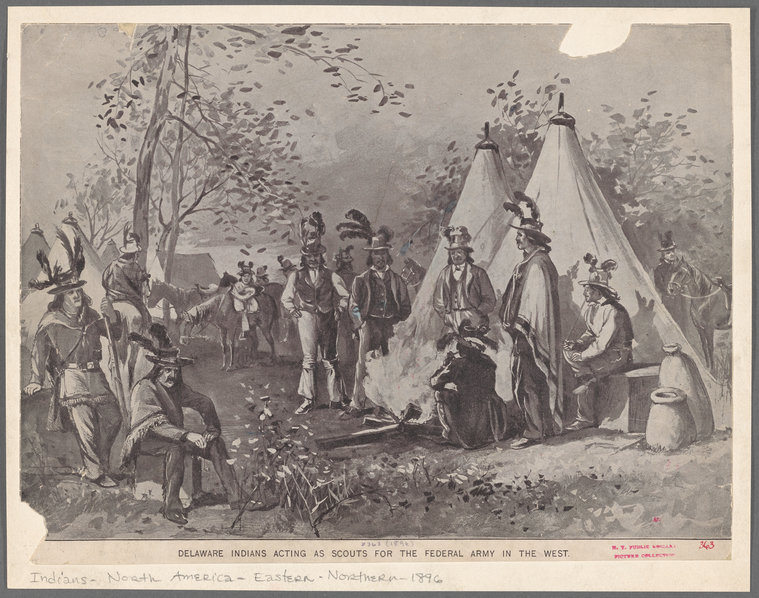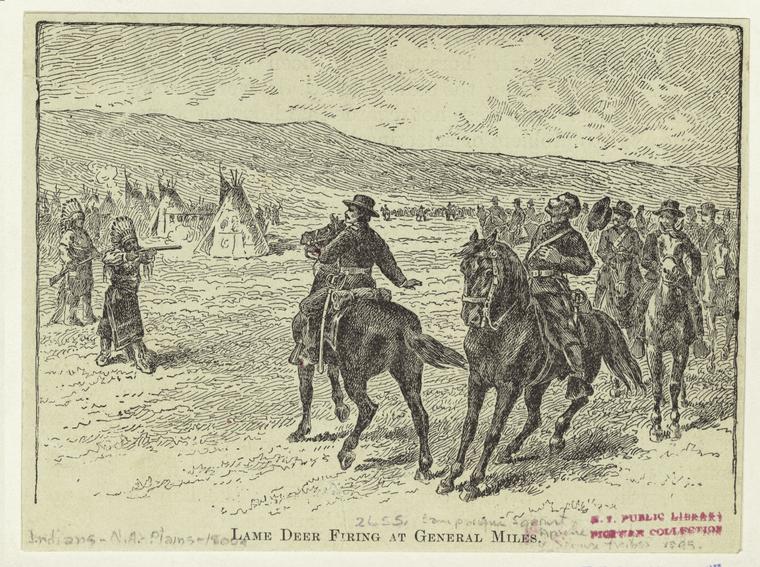 Many Native Americans served in the Union and confederate military during the Civil War. The Delaware tribe had a long history of allegiance to the U.S. government, despite removal to the Wichita Indian Agency in Oklahoma and the Indian Territory in Kansas.
Many Native Americans served in the Union and confederate military during the Civil War. The Delaware tribe had a long history of allegiance to the U.S. government, despite removal to the Wichita Indian Agency in Oklahoma and the Indian Territory in Kansas.
On October 1, 1861 the Delaware people proclaimed their alliance to the Union. During the war 170 out of 201 Delaware men volunteered in the Union Army. A journalist from Harper's Weekly described them as being armed with tomahawks, scalping knives, and rifles.

In January 1862, William Dole, U.S. Commissioner of Indian Affairs, asked Native American agents to "engage forthwith all the vigorous and able-bodied Native Americans in their respective agencies." The request resulted in the assembly of the 1st and 2nd Indian Home Guard.
Many Native American tribes fought in the war including: the Delware, Creek, Cherokee, Seminole, Kickapoo, Seneca, Osage, Shawnee, Choctaw, Lumbee, Chickasaw, Iroquois, Powhatan, Pequot, Ojibwa, Huron, Odawa, Potawatomi, Catawba, and Pamunkey. The Cherokee, Choctaw, Seminole, Catawba, and Creek tribes were the only tribes to fight on the Confederate side. Like other American communities, some tribes had members fighting on either side of the war. The majority of the Creek sided with the Union as two-thirds of the people preferred to be guided by the advice of their chief Opothle Yahola. Ex-Chief McIntosh was bought by the South, whose leaders appointed him a colonel in the Confederate Army. During November 1861, the Creek, Black Creek Indians, and White Creek Indians of their tribe were led by Creek Chief Opothle Yahola, fought three pitched battles against Confederate whites and other Native Americans that joined the Confederates to reach Union lines in Kansas, and offer their services.
Some Civil War battles occurred in Indian Territory. The first battle occurred July 1–2, 1863 which involved the 1st Kansas Colored Infantry. The first battle against the Confederacy outside of Indian Territory occurred at Horse Head Creek, Arkansas, on February 17, 1864, and involved the 79th U.S. Colored Infantry.
Native Americans swearing in for the American Civil War.The Delaware demonstrated their "loyalty", daring and hardihood" during the attack of the Wichita Agency in October 1862. Considered a major Union victory, Native American cavalrymen killed five Confederate agents, took the Rebel flag and $1200 in Confederate currency, 100 ponies, and burned correspondence along with the Agency buildings.
The Cherokee Nation had an internal civil war.The Nation divided, with one side led by Principal Chief John Ross and the other by renegade Stand Watie. Chief John Ross wanted to remain neutral throughout the war, but Confederate victories at First Manassas and Wilson's Creek forced the Cherokee to reassess their position. All other Native American tribes bordering the Cherokee were on the Confederate side, which added to the pressure of possible occupation by the Confederate forces.
Stand Watie, along with a few Cherokee, sided with the Confederate Army, in which he was made Colonel and commanded a battalion of Cherokee. Reluctantly, on October 7, 1861, Chief Ross signed a treaty transferring all obligations due to the Cherokee from the U.S. Government to the Confederate States.In the treaty, the Cherokee were guaranteed protection, rations of food, livestock, tools and other goods, as well as a delegate to the Confederate Congress at Richmond.In exchange, the Cherokee would furnish ten companies of mounted men, and allow the construction of military posts and roads within the Cherokee Nation. However, no Indian regiment was to be called on to fight outside Indian Territory.As a result of the Treaty, the 2nd Cherokee Mounted Rifles, led by Col. John Drew, was formed. Following the Battle of Pea Ridge, Arkansas, March 7–8, 1862, Drew's Mounted Rifles defected to the Union forces in Kansas, where they joined the Indian Home Guard. In the summer of 1862, Federal troops captured Chief Ross, who was paroled and spent the remainder of the war in Washington and Philadelphia proclaiming Cherokee loyalty to the Union army.[
No comments:
Post a Comment